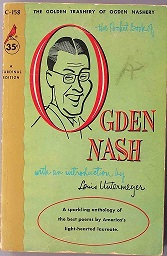
Word of the Day: Poem
Paul Schleifer
According to the OED, a poem is a “piece of writing or an oral composition, often characterized by a metrical structure, in which the expression of feelings, ideas, etc., is typically given intensity or flavour by distinctive diction, rhythm, imagery, etc.; a composition in poetry or verse.” The first record, again according to the OED, of the word’s usage comes from 1487, from John Skelton’s translation Diodorus Siculus Bibliotheca Historica Proh. 8 Poemys after myn oppynyon delyten the mynde of man with wanton pleasure.”
According to www.etymonline.com, poem comes “from Latin poema “composition in verse, poetry,” from Greek poema “fiction, poetical work,” literally “thing made or created,” early variant of poiema, from poein, poiein, “to make or compose.” So a poet is a maker, and a poem is something made.
The United Nations Educational, Scientific and Cultural Organization (UNESCO) proclaimed, back in 1999, March 21 as World Poetry Day. Here is the UNESCO statement about it on its webpage:
“Poetry reaffirms our common humanity by revealing to us that individuals, everywhere in the world, share the same questions and feelings. Poetry is the mainstay of oral tradition and, over centuries, can communicate the innermost values of diverse cultures.
“In celebrating World Poetry Day, March 21, UNESCO recognizes the unique ability of poetry to capture the creative spirit of the human mind.
“One of the main objectives of the Day is to support linguistic diversity through poetic expression and to offer endangered languages the opportunity to be heard within their communities.
“The observance of World Poetry Day is also meant to encourage a return to the oral tradition of poetry recitals, to promote the teaching of poetry, to restore a dialogue between poetry and the other arts such as theatre, dance, music and painting, and to support small publishers and create an attractive image of poetry in the media, so that the art of poetry will no longer be considered an outdated form of art, but one which enables society as a whole to regain and assert its identity.”
As Christians, we believe that man was made in God’s image, and since God is a Creator, it follows that we are meant to be creators, poets, as well.
Good poetry is, in my opinion, language that meets Alexander Pope’s definition of wit: “What oft was thought, but ne’er so well expressed. Here are some quotes from other famous people about poetry:
I would define poetry as the rhythmical creation of beauty. – Edgar Allen Poe
Prose: words in their best order; poetry: the best words in the best order. – S. T. Coleridge
…the record of the best and happiest moments of the best and happiest minds… – P. B. Shelley
…speech framed…to be heard for its own sake and interest even over and above its interest of meaning… – Gerard Manley Hopkins
…language that tells us, through a more or less emotional reaction, something that cannot be said…
– E. A. Robinson
Poetry amounts to arranging words with the greatest specific gravity in the most effective and externally inevitable sequence. – Joseph Brodsky
If I read a book and it makes my whole body so cold no fire can ever warm me, I know that it is poetry. — Emily Dickinson
I found these quotes on this website: http://www.tnellen.com/cybereng/poetry.html. And here’s a poem that is on the same website:
After English Class
I used to like Stopping by Woods on a Snowy Evening.
I liked the coming darkness,
The jingle of harness bells, breaking–and adding to
–the stillness,
The gentle drift of snow. . . .
But today, the teacher told us what everything stood for.
The woods, the horse, the miles to go, the sleep–
They all have hidden meanings.
It’s grown so complicated now that,
Next time I drive by,
I don’t think I’ll bother to stop.
-Jean Little’s _Hey World, Here I am_
And here’s my commentary: poems do not have “hidden meanings,” no matter what your high school English teacher may have told you. The meaning of a poem is right there for everybody to see, if they will only look. Oh, yes, some poems are harder than other poems, but not because the meaning is hidden. Rather, what makes a poem more difficult is the background of the poet, her knowledge, her experiences, her reading, the literature she is responding to. A poet like T. S. Eliot seems difficult because he knew so much and so much of his reading found its way into his poetry.
Let me finish with another poem, this one in a lighter vein. It’s called “Song Of The Open Road” by Ogden Nash.
I think that I shall never see
A billboard lovely as a tree
Indeed, unless the billboards fall
I’ll never see a tree at all.
I hope you hear the allusion in the poem.
The Image is the cover of The Pocketbook of Ogden Nash (1902-1971), an American who wrote mostly comic poetry.